|
|
|
Sort Order |
|
|
|
Items / Page
|
|
|
|
|
|
|
| Srl | Item |
| 1 |
ID:
170069
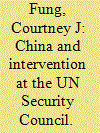

|
|
|
|
|
| Publication |
New York, Oxford University Press, 2019.
|
| Description |
xix, 282p.: tables, graphs, abbre.hbk
|
| Standard Number |
9780198842743
|
|
|
|
|
|
|
|
|
|
|
|
Copies: C:1/I:0,R:0,Q:0
Circulation
| Accession# | Call# | Current Location | Status | Policy | Location |
| 059801 | 341.2351/FUN 059801 | Main | On Shelf | General | |
|
|
|
|
| 2 |
ID:
125332
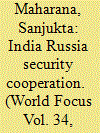

|
|
|
|
|
| Publication |
2013.
|
| Summary/Abstract |
Russia occupies an important place in the energy security of India and also has become an important arms supplier as well as joint producer of arms and armament, making itself an important partner of provider of security to India. The role of India and Russia in the process of peace building in Central Asia and Afghanistan would contribute to the establishment of a peaceful, democratic, secure, stable as well as multipolar world.
|
|
|
|
|
|
|
|
|
|
|
|
|
|
|
|
| 3 |
ID:
131867
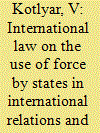

|
|
|
|
|
| Publication |
2014.
|
| Summary/Abstract |
IN ACCORDANCE WITH the UN Charter, a Bible of contemporary international law, all UN members "shall settle their international disputes by peaceful means" and "shall refrain in their international relations from the threat or use of force" (Article 2, Paragraphs 3-4). The Charter allows, in the form of an exception to this general rule, states to use force in only two cases - as self-defense against an armed attack from the outside (Article 51) and, following a UN Security Council (UNSC) decision, to remove a threat to the peace, breach of the peace, or act of aggression (Articles 39-42).
|
|
|
|
|
|
|
|
|
|
|
|
|
|
|
|
| 4 |
ID:
102336
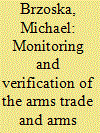

|
|
|
| 5 |
ID:
123654
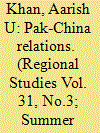

|
|
|
| 6 |
ID:
126049
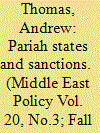

|
|
|
| 7 |
ID:
117399
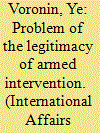

|
|
|
|
|
| Publication |
2012.
|
| Summary/Abstract |
THE ATLANTIC ALLIANCE'S military intervention in Libya, like similar actions by Western community nations (in Yugoslavia, Iraq, Kosovo), which have questioned the principles and rules of modern international law, above all the principle of state sovereignty, does not appear to have received proper, qualified legal evaluation as yet.
Apart from being out of tune with the mandate under United Nations Security Council resolution 1973, the anti-Libyan military action by NATO countries was also not in keeping with Article 42 of the UN Charter, on which rests the contemporary application of the doctrine about coercive measures involving the use of armed force. The decision on the use of force was sanctioned by the Security Council, but the character of its "unlimited" use was fixed by a group of leading Western powers, with participation from NATO's military structures. Modern practice provides for the Security Council to delegate limited powers to use military force.1 In the case of Libya, the provision of a mandate allowing limited use of force in the form of establishing a no-fly zone over Libyan territory to prevent the Qaddafi regime's use of deadly force against its own people was not accompanied by any UN participation in the form of auxiliary functions of peacekeeping nature (surveillance, monitoring) - as it was for example in the peace settlement under the Dayton Accords, or with the "parallel strategy" in Bosnia and Herzegovina.
|
|
|
|
|
|
|
|
|
|
|
|
|
|
|
|
| 8 |
ID:
086171
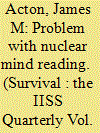

|
|
|
|
|
| Publication |
2009.
|
| Summary/Abstract |
The basic technologies that underlie nuclear power were first developed during the Second World War by the United States for purely military purposes. Since then, extensive civilian research and the use of nuclear technologies for peaceful ends has not erased this military heritage. Almost all nuclear technology in use around the world today is 'dual use', able to contribute to the production of fuel for nuclear reactors or the explosive components of nuclear weapons. For this reason, there is serious concern that supposedly peaceful nuclear programmes are being used for, or could become, cover for the development of nuclear weapons.
|
|
|
|
|
|
|
|
|
|
|
|
|
|
|
|
| 9 |
ID:
123980
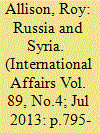

|
|
|
|
|
| Publication |
2013.
|
| Summary/Abstract |
This article explores explanations of Russia's unyielding alignment with the Syrian regime of Bashar al-Assad since the Syrian crisis erupted in the spring of 2011.
Russia has provided a diplomatic shield for Damascus in the UN Security Council and has continued to supply it with modern arms. Putin's resistance to any scenario of western-led intervention in Syria, on the model of the Libya campaign, in itself does not explain Russian policy. For this we need to analyse underlying Russian motives. The article argues that identity or solidarity between the Soviet Union/Russia and Syria has exerted little real influence, besides leaving some strategic nostalgia among Russian security policy-makers. Russian material interests in Syria are also overstated, although Russia still hopes to entrench itself in the regional politics of the Middle East.
Of more significance is the potential impact of the Syria crisis on the domestic political order of the Russian state. First, the nexus between regional spillover from Syria, Islamist networks and insurgency in the North Caucasus is a cause of concern-although the risk of 'blowback' to Russia is exaggerated. Second, Moscow rejects calls for the departure of Assad as another case of the western community imposing standards of political legitimacy on a 'sovereign state' to enforce regime change, with future implications for Russia or other authoritarian members of the Commonwealth of Independent States.
Russia may try to enshrine its influence in the Middle East through a peace process for Syria, but if Syria descends further into chaos western states may be able to achieve no more in practice than emergency coordination with Russia.
|
|
|
|
|
|
|
|
|
|
|
|
|
|
|
|
| 10 |
ID:
092024
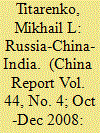

|
|
|
|
|
| Publication |
2008.
|
| Summary/Abstract |
It is for third time that Moscow and the headquarters of the Russian Academy of Science host the good partners and friends- participants of the trilateral conference of Russia,
China and India.
|
|
|
|
|
|
|
|
|
|
|
|
|
|
|
|
| 11 |
ID:
119404
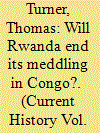

|
|
|
|
|
| Publication |
2013.
|
| Summary/Abstract |
[T]he arrest of Ntaganda and his trial should serve as reminders to the Rwandan authorities that their interference in DRC is no longer acceptable, if it ever was.
|
|
|
|
|
|
|
|
|
|
|
|
|
|
|
|
|
|
|
|
|